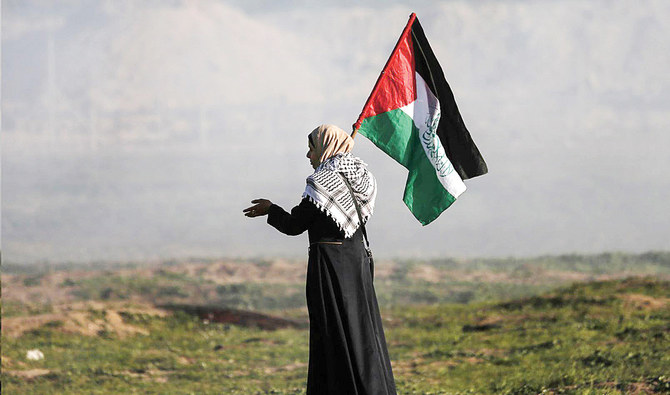JERUSALEM: The Israeli elections have divided Palestinians between those who feel there is little or no difference between the leading Zionist Israeli parties (Likud and Blue and White) and those who insist that the failure of Netanyahu is of utmost importance.
The largest selling Palestinian daily Al Quds led with an editorial on Monday titled “Two faces of the same coin,” arguing that expecting much from either of the main Zionist parties is “betting on a loser in many ways.” The Jerusalem-based newspaper said that the only bet should be on “our own people and the Arab and Islamic peoples.”
But the director general of the Masarat think tank in Ramallah thinks that there is a clear difference. “The substantive difference between (Prime Minister Benjamin) Netanyahu and (opposition leader Benny) Gantz is that Netanyahu is stronger, more dangerous, much more experienced and trying to please the radical right so that they give him immunity from the trial on corruption charges.” Hani Masri says that the strong relations between Netanyahu and US President Donald Trump also gives Netanyahu another dangerous tool against Palestinians.
Naser Laham, the editor of the Maan News Agency, notes that dramatic changes will happen after the elections from Netanyahu. “If Netanyahu wins, he will find the resistance waiting for him and if he loses, he will have the police ready to put him in jail for corruption.”
Ibrahim Milhem, spokesman for the Palestinian government, told Arab News that the sharp shift in the Israeli political map toward the right and far-right has led to the retraction of the left-wing and peace camp. “This has led many to believe that there is no difference between right and left except in how badly they want to oppress Palestinians.”
LIVE: Coverage of the Israel’s do-over election. Exit polls show Netanyahu, Gantz in tight race
Milhem believes that the absence of Netanyahu from the political scene is important. “The absence will be a punishment for his foolish policies. This doesn’t mean that his opponents will have any important initiative regarding the two-state solution or the recognition of the rights of the Palestinian people in their independent state on the 1967 borders with Jerusalem as its capital and the recognition of the right of return of the refugees based on UN resolution 194.”
Former senior editor of Al-Hayyat Al-Jadida, Montaser Hamdan, told Arab News that the election campaign needs are behind all recent acts and statements. “The threat of annexing the Jordan Valley is clearly aimed at pleasing the far right in Israel as is the call for annexing parts of Hebron.” Hamdan says that Israeli candidates are “dealing with Palestinian and Arab blood and rights with the aim of expanding their occupation.”
Hamadeh Faraneh, a member of the Palestinian National Council, told Arab News that no two individuals are the same. “There are always differences between people and Netanyahu is clearly the more dangerous of the two candidates for prime minister.”
Faranheh says that the current Israeli prime minister is ideologically and politically committed to opposition to the Palestinian people and their rights and in carrying out the most radical Israeli program against Palestinians. “Getting rid of him will remove a major obstacle for peace and allow for a gradual return especially if leaders from the Arab community inside the 1948 areas can have a role with Gantz in a coalition government.”
Botrus Mansour, a Nazareth-based lawyer, told Arab News that Palestinian citizens of Israel can have a role in blocking the chances of Netanyahu’s return to power. “Their role is important in that they can participate in a blocking coalition that prevents Netanyahu from returning to power even if a left-wing government is not established.”














